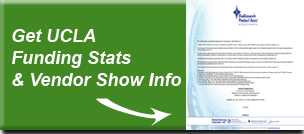Stem cell research at the University of California Los Angeles' Jules Stein Eye Institute has led to a limited clinical trial that has produced astounding results for two patients with a form of macular degeneration that had progressed to the point of causing near blindness. A short time after receiving stem cell injections the two women began to regain vision, enabling them to function independently in ways they couldn't before the procedure. The story was broadcast on NPR and other media sources with some restraint (it was a small study, with only two patients so far), but obvious excitement (it worked!). On the part of the researchers, the trial procedure held limited expectations for success, in part because the quantity of stem cells they utilized was fairly small. The results were all the more wondrous for coming as a real surprise, not least of all for the patients themselves.
Ophthalmologist Steven Schwartz of the Geffen School of Medicine at UCLA performed the procedures last summer, and the article documenting the results has just been published in The Lancet. Another patient in the trial (which will ultimately include 24 subjects) was treated by Dr. Schwartz just last week, and is recovering well. The stem cells are provided by Advanced Cell Technology (ACT), the company sponsoring the trial study. ACT begins with embryonic stem cells and cultures them to create the specific retinal pigment epithelial (RPE) stem cells injected just below the retinae of the study patients, all of whom suffer from Stargardt's macular distrophy disease or dry age-related macular degeneration, which are two of the most common causes of acquired blindness.
[Photo courtesy of NPR, credit: Melissa Forsyth]
Sue Freeman of Southern California was one of the study subjects (above photo). She recounts her first realization of the treatment's success in an interview with NPR:
"One day, I looked down and I could see my watch," she said. "I probably hadn't seen it in about a year and a half or two. And I could see. So that was exciting for me. And I remember saying, 'Oh my goodness. I can see my watch. I can actually tell time."
How important is this study? Consider that stem cell research is still relatively young and continues to be threatened by challengers to the Presidency, and that this is the first human trial to be completed and published, with promising results, and you have a sense of the magnitude of what's been accomplished. That the trial is being conducted at UCLA is not surprising. UCLA's Broad Center of Regenerative Medicine is a leader in stem cell research, with over 200 scientists working in sophisticated labs on campus, including a whole floor in the new Terasaki Life Sciences Building (see our blog on its opening last year). In addition to strong private donations by philanthropists like Eli and Edythe Broad, UCLA receives more funding from the California Institute for Regenerative Medicine (CIRM) than any other public institution in the state, with a total to-date of some $158.3M.
Biotechnology Calendar, Inc. will be on the UCLA campus on April 5, 2012, for our highly-popular semiannual Los Angeles Biotechnology Vendor Showcase™ expo, then again on October 4, 2012. For information on exhibiting, click below:
Biotechnology Calendar, Inc. is a full service event marketing and planning company producing on-campus, life science research tradeshows nationwide for the past 19 years. We plan and promote each event to bring the best products and services to the best research campuses across the country. Visit our website for information about upcoming shows in your area and to register to exhibit or attend. Or call to talk to one of our friendly, knowledgeable sales associates.



